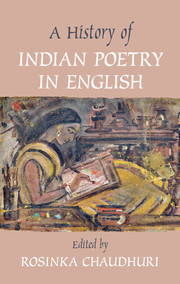Book contents
- Frontmatter
- Contents
- Contributors
- Acknowledgments
- Introduction
- SECTION I THE BROAD NINETEENTH CENTURY: INDIANS IN ENGLISH AND THE ENGLISH IN INDIA
- SECTION II PUBLISHERS, PUBLISHING HOUSES, AND THE PERIODICAL PRESS
- SECTION III POETRY: 1950–2000
- SECTION IV POETS OF THE DIASPORA
- 22 “My First, and Only, Sight”: A. K. Ramanujan and the Five Senses
- 23 U.S.-Based but India-Born: G. S. Sharat Chandra and Vijay Seshadri
- 24 “First and Foremost … A Poet in the English Language”: Agha Shahid Ali
- 25 The Languages of Diaspora: Meena Alexander, Sujata Bhatt, Imtiaz Dharker
- SECTION V THE NEW MILLENNIUM POETS ON THEMSELVES
- Bibliography
- Index
24 - “First and Foremost … A Poet in the English Language”: Agha Shahid Ali
from SECTION IV - POETS OF THE DIASPORA
Published online by Cambridge University Press: 05 March 2016
- Frontmatter
- Contents
- Contributors
- Acknowledgments
- Introduction
- SECTION I THE BROAD NINETEENTH CENTURY: INDIANS IN ENGLISH AND THE ENGLISH IN INDIA
- SECTION II PUBLISHERS, PUBLISHING HOUSES, AND THE PERIODICAL PRESS
- SECTION III POETRY: 1950–2000
- SECTION IV POETS OF THE DIASPORA
- 22 “My First, and Only, Sight”: A. K. Ramanujan and the Five Senses
- 23 U.S.-Based but India-Born: G. S. Sharat Chandra and Vijay Seshadri
- 24 “First and Foremost … A Poet in the English Language”: Agha Shahid Ali
- 25 The Languages of Diaspora: Meena Alexander, Sujata Bhatt, Imtiaz Dharker
- SECTION V THE NEW MILLENNIUM POETS ON THEMSELVES
- Bibliography
- Index
Summary
Agha Shahid Ali (1949–2001) has been critically acclaimed both in America and internationally and his work has been translated into several languages, including Italian, Hebrew, Kashmiri, and Urdu. Shahid was very clear about his identity as a poet. Describing his voice as “deeply rooted, and yet cosmopolitan,” he considered himself, “first and foremost … a poet in the English language.” He underscored that he “own[ed] three major world cultures (Hindu, Muslim, and Western) without effort,” and as he grew up with them, he felt these three were, as he put it, “a part of his mental and emotional makeup.” He said, “I can use the Indian landscape, and the Subcontinent's myths and legends and history, from within, and I can do so for the first time in what might seem like a new idiom, a new language – Subcontinental English.” Shahid pointed out that “in India he [made] his case by making one for all South Asian writers in English – that they all are privy to triple or more mixes, which they can exploit from within … the way the spirit of Urdu weaves itself into my English.” Without the desire to represent India to the West, he could write in English with an inwardness about the immense resource that the subcontinent offered. Growing up speaking English and Urdu, and hearing Hindi, Punjabi, and Kashmiri, he “just assumed that cosmopolitanism was the way to be, that for him it was the natural state.” “The accidents of history,” Shahid said, “had put [him] in the enviable … situation of contributing simultaneously to three … traditions: the new Anglophone literatures of the world, the new Subcontinental literatures in English, and the new Multi-Ethnic literatures of the United States.”
Having published two books of poetry with Writers Workshop, Calcutta – Bone-Sculpture (1972) and In Memory of Begum Akhtar (1975) – he established a reputation in the early 1970s as an expert on Modern Poetry at Hindu College in Delhi, subsequently leaving it in 1975 for Pennsylvania State University's doctoral program in English. It is noteworthy that an early formative influence, T. S. Eliot, whom we can hear in The Half-Inch Himalayas, was the focus of Shahid's doctoral dissertation.
- Type
- Chapter
- Information
- A History of Indian Poetry in English , pp. 375 - 388Publisher: Cambridge University PressPrint publication year: 2016



